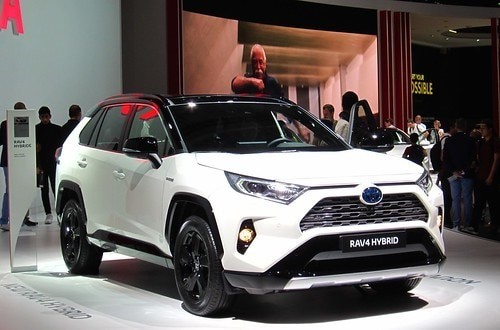Hybrid cars have surged in popularity, offering a compelling blend of fuel efficiency and reduced emissions. Toyota, a pioneer in hybrid technology, introduced the Prius to the US market two decades ago, sparking a revolution. Yet, a common concern lingers among prospective buyers: the longevity of hybrid batteries and the potential cost of replacement. This concern extends to the used car market, where older hybrids are becoming increasingly available. This article delves into the lifespan of Toyota hybrid batteries, exploring their expected duration and how to maximize their life, providing valuable insights for both new and used hybrid car buyers.
Decoding Toyota Hybrid Battery Lifespan Expectations
 2021 Toyota RAV4 Hybrid in White at Auto Show
2021 Toyota RAV4 Hybrid in White at Auto Show
Toyota boasts an impressive lineup of hybrid vehicles, from the iconic Prius to popular models like the Corolla, Camry, Avalon, Sienna, RAV4, Highlander, and the Venza SUV. Renowned for reliability and exceptional fuel economy, these vehicles raise a crucial question: How Long Can A Hybrid Car Battery Last in these models?
Industry standards suggest that hybrid batteries typically last between 80,000 to 100,000 miles. However, Toyota has consistently exceeded these expectations. Prior to 2020, Toyota backed their hybrid batteries with an 8-year or 100,000-mile warranty. Demonstrating their confidence in their technology, Toyota significantly enhanced this coverage in 2019. For 2020 models onwards, Toyota extended the hybrid battery warranty to an impressive 10 years from the vehicle’s first use or 150,000 miles, whichever comes first.
This extended warranty offers significant peace of mind to Toyota hybrid owners planning long-term vehicle ownership. Furthermore, it reassures those considering used hybrid cars, mitigating concerns about expensive battery replacements. With the average American driving approximately 10,000 miles annually and keeping their vehicles for 6 to 12 years, Toyota’s warranty often covers a substantial portion, if not the entirety, of typical ownership. Anecdotal evidence from Toyota hybrid owners even suggests battery lifespans exceeding 200,000 miles. This robust longevity means a used 10-year-old hybrid could still possess a battery with potentially up to 100,000 miles of remaining life, often outlasting the vehicle’s expected lifespan.
The Science Behind Toyota Hybrid Battery Longevity
Consumer Reports conducted insightful battery tests a decade ago, comparing a high-mileage 2002 Toyota Prius (over 200,000 miles) against a near-identical 2001 Prius with only 2,000 miles (previously tested 10 years prior). The results were striking: minimal degradation in fuel economy and acceleration performance in the high-mileage Prius. Testers were further impressed by the vehicle’s overall condition, noting the original engine, transmission, and even shocks were still performing well, highlighting Toyota’s commitment to quality engineering.
The exceptional lifespan of Toyota hybrid batteries stems from their advanced nickel-metal hydride battery packs. Sophisticated battery management systems and computer-controlled charge controllers play a crucial role. These systems meticulously maintain the battery charge within an optimal range, typically between 20% and 80%. This “shallow cycling” strategy, controlled by advanced computer systems, significantly reduces battery stress, enhancing thermal management, and ultimately extending the battery’s overall cycle life and long-term durability.
Factors Influencing Your Hybrid Battery’s Lifespan
Like any car component, the hybrid battery lifespan is influenced by various factors. Driving habits, maintenance practices, charging routines, and even environmental conditions can all play a role in battery health and longevity.
Regular maintenance is paramount for optimal hybrid system performance. The gasoline engine and electric motor in a hybrid system are interconnected. Inefficiencies in one can strain the other. Routine servicing, therefore, should include battery checks. Identifying and addressing weak battery cells through reconditioning can proactively extend the battery’s life. Neglecting scheduled maintenance can conversely shorten it.
Charging habits are also critical. Adhering to manufacturer-recommended charging guidelines is crucial for maximizing battery life. It’s generally advisable to avoid fully depleting the battery and to ensure complete charges when it runs low. Frequent short top-ups and consistently driving with a near-empty battery should be avoided.
Temperature extremes can negatively impact battery performance and longevity. Hybrid batteries are engineered to operate within specific temperature ranges. Prolonged exposure to extreme heat or cold can induce battery damage. In hot climates, auxiliary battery systems help regulate temperature. Regular cleaning of the auxiliary fan, as part of routine maintenance, is essential to ensure effective cooling airflow and optimal battery temperature management.
Recognizing Signs of Hybrid Battery Degradation
While Toyota hybrid batteries are designed for long life, eventual degradation is natural. Recognizing early warning signs can help address potential issues promptly. Common symptoms of a battery nearing the end of its life include:
- Deteriorating Fuel Economy: A noticeable decrease in fuel efficiency compared to usual figures can indicate reduced battery performance.
- Rapid Battery Discharge: If the battery loses charge quickly and doesn’t hold it as long as it used to, it may signal declining health.
- Delayed Battery Engagement: If the electric motor doesn’t engage as readily or seamlessly as before, it could be a sign of battery weakness.
- Erratic Electrical Behavior: Unusual fluctuations in electrical systems powered by the battery may suggest battery problems.
- Sluggish Driving Performance: As the hybrid battery contributes to powering the wheels, a weakening battery can impact acceleration and overall driving feel, potentially manifesting as sluggishness or uneven transmission-like sensations.
For Toyota hybrid vehicles, these symptoms are less likely to appear prematurely unless the car is significantly aged or has accumulated very high mileage. However, if you observe any of these performance declines, scheduling a service appointment at a certified Toyota service center, like Kings Toyota, for a comprehensive battery check is recommended to ensure continued reliable hybrid operation. Don’t hesitate to call us to schedule your service and maintain your hybrid’s peak performance.